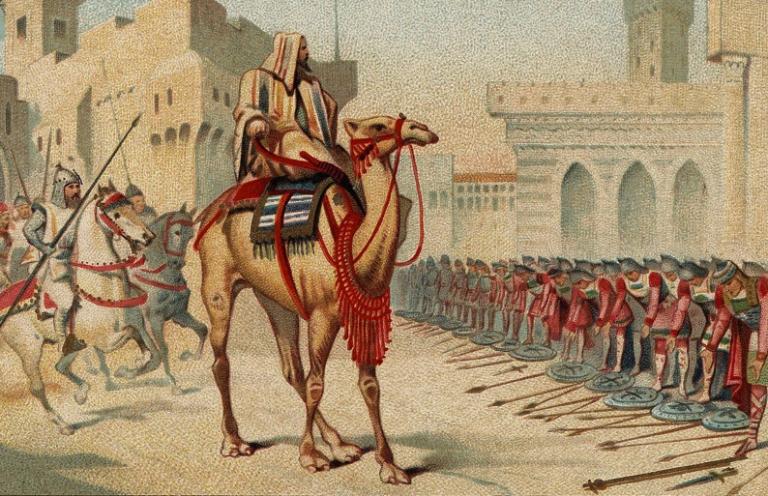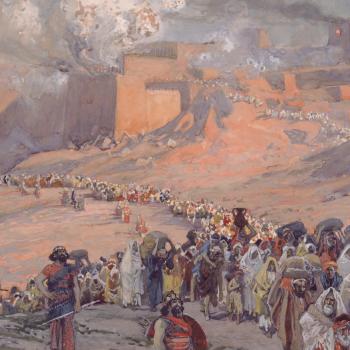
(Wikimedia Commons public domain image)
Abu Bakr was the first man to bear the title of caliph, to serve as the political successor of the Prophet.[1] He lived for only two more years beyond the death of Muhammad, but it was during his rule that a series of small campaigns known as the “Wars of the Ridda” reestablished the control of the new Islamic “state” over the Arabian peninsula. Just before his death in 634 A.D., Abu Bakr nominated Umar as his successor. Under Umar’s leadership, the wars that had first been directed against “rebellious” Arabian tribes went on. But when the entire Arabian peninsula had been pacified and put back under Muslim control, the military and raiding energies of the Arabs had to be directed outward. Oddly enough, the Arab empire does not seem to have been planned. It simply happened. (Although perhaps no event in human history is really so simple as that. This one, the rise of an Arab empire, seems quite clearly to have fulfilled the words of the angel to Hagar, exiled in the desert and resigned to the death of her son Ishmael: “Arise, lift up the lad, and hold him in thine hand; for I will make him a great nation.”)[2] One weak state after another fell to the Arabs, who must have been as amazed at their good fortune as we are today in reading about it. Even the Byzantines and the Persians, the two great powers of the day, had been exhausted by their long war with one another and were no match for the upstarts from the desert. (It’s easy to understand why this might seem providential, from a Muslim point of view.)
Arab armies conquered Syria easily (635-636), including Palestine and Jerusalem itself. (The Arabs appear to have been welcomed by the local Jewish population there. After the conquest, the reasoning seems to have gone, things could only get better for the Jews. And they did. Tiberias, the Galilean town where the so-called Jerusalem Talmud was completed, remained a center for Jewish study of the Bible and for the study of the Hebrew language for generations beyond the Arab conquest.) By 637, Arab forces occupied lower Iraq, and by 641 they had taken all of Mesopotamia, the area of the Tigris and Euphrates rivers. The Persian empire, where the Jews again welcomed the Arab liberators, also came under attack. By the 650s, it had ceased to exist. The Byzantines took heavy losses as well. In 642, Egypt, which had been the breadbasket of the Roman empire since the days of the first Caesars, fell to the Arabs. (The invaders were assisted by local Christians, furious at the treatment their denomination was receiving from the imperial governors sent from Constantinople.) Garrison towns were established throughout the conquered territories, including such famous places as Basra and Kufa, and Fustat, which would eventually become the great city of Cairo.
[1] The word caliph is usually pronounced KAY-liff in English, although the Arabic is khalifa (pronounced kha-LEE-fuh). It means something like “stand-in,” or “deputy” (to the Prophet).
[2] Genesis 21:18. Compare Genesis 17:20, already quoted.
Posted from Seaside, Oregon












